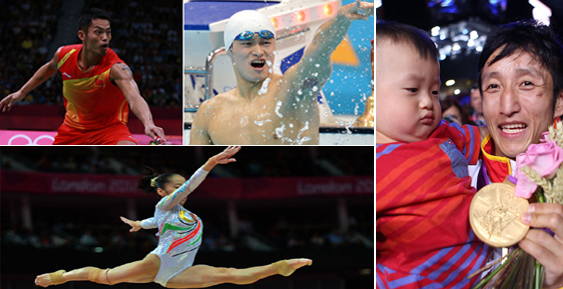Second, but not playing second fiddle
- By Jin Liangxiang
 0 Comment(s)
0 Comment(s) Print
Print E-mail China.org.cn, August 15, 2012
E-mail China.org.cn, August 15, 2012
 |
|
Chinese gold medalists at?the London Olympic Games |
The Olympics may finally have ended, but that does not mean that all discussions regarding the 2012 London games have concluded.
Despite the warm welcome home enjoyed by China's Olympians, it seems that the Chinese audience regrets, at least to some extent, the fact that China failed to repeat their feat in Beijing and finish top of the medal table. We were right to have high expectations of our team, but, in fact, China is a worthy number two and should appreciate its status as the current number two.
The Olympic Games, despite being rather technical in the way some events are decided, also reflects a state of genuine competition and comprehensive national strengths. Behind the Games, there are non-sporting competitions, including economic resources, advancements in science and technology and the effectiveness of these mechanisms to rally all the needed resources.
There is no doubt that China's achievements at recent Olympics have been remarkable. The number of gold medals won has been steadily increasing since the Los Angeles Olympics in 1984, which marked China's first meaningful participation in the Olympics. Since the Sydney Games in 2000, China has maintained a top three placing on the medal table and Chinese athletes have won medals in nearly all Olympic sports.
However, the Chinese audience should also be aware that, despite topping the medal table as hosts in 2008, China is still some way off being number one. Despite dominating in its traditionally strong sports such as gymnastics, ping-pong and badminton, Chinese athletes are obviously weak in other events.
Liu Xiang has certainly been among the leading contenders for gold at recent championships, despite the debacle in Beijing and his most recent disappointment due to injury in London. However, other than Liu, China has a dearth of world class track and field athletes.
Yao Ming, ex NBA star with the Houston Rockets, was another world class athlete. But the performance of the Chinese national basketball team without Yao has been lackluster, to say the least. And the performances of Chinese teams in other major ball games fall beneath what would be expected of a leading sports power. Chinese women's volleyball used to be the best, but the team lost in their quarter-final against Japan in London.
Politically, the world is not yet ready for China to assume number one status. Despite repeated pleas from the International Olympic Committee's (IOC) that the Games should be purely sporting in nature, they have been greatly politicized. In some way, this is inescapable: How can an event which attracts so many people from across the world fail to become politicized?
Just like in other arenas, in the recent Olympics, China was the victim of increasing levels of politicization. When the young female swimming star Ye Shiwen won gold in the 200 and 400 meters individual medleys, she faced unsubstantiated doping allegations from some Western media. The results of official drug tests administered to all medal winners proved that she was clean and that the allegations were false. Some observers felt that Chinese gymnast Chen Yibing was robbed of gold due to unfair judging. In addition, the rules of ping pong were changed, increasing the size of the ball and also reducing the number of points necessary to win sets. It seems clear that such changes were implemented to negate Chinese dominance of the game, which has been clear for all to see over the last decade.
Despite the fact that the Olympics should not be associated with politics, the stern questions and apparent envy leveled at the Chinese team was eerily similar to the global criticism China faced recently in the political arena. Or to put it another way, the criticism of China in the international sports area is a reflection and extension of the West's sense of unease about China's emergence in international politics.
The Chinese audience has reasons to feel depressed because of unfair treatment. But China should also be clear that it makes no sense keep voicing dissatisfaction about judging and Western media bias. The most important thing is that China manages its own affairs well. China's experience in ping-pong matches indicates that however the rules are changed, China's dominance is unshakable. And it is evident that bias and changing rules can never contain the emergence of China as a global sporting power.
China should also bear in mind that it is no bad thing to be number two, although it should be ready for the fact that it will face further questions and criticisms when it eventually takes the top spot. We should also note the fierce determination displayed by other countries. Barack Obama, president of the United States, once said that the US will never be number two.
All in all, China is not yet ready to be number one, and the world is not yet ready, either. For now, being number two will do just fine.
The author is a columnist with China.org.cn. For more information please visit http://m.keyanhelp.cn/opinion/jinliangxiang.htm
Opinion articles reflect the views of their authors, not necessarily those of China.org.cn.





